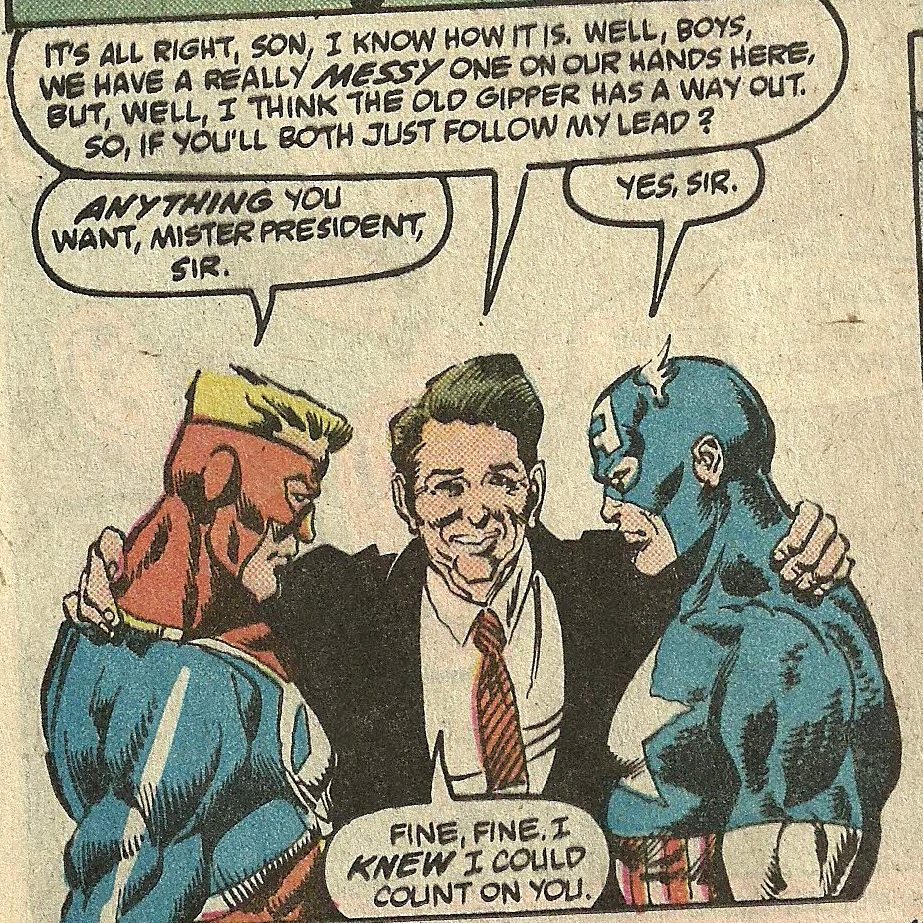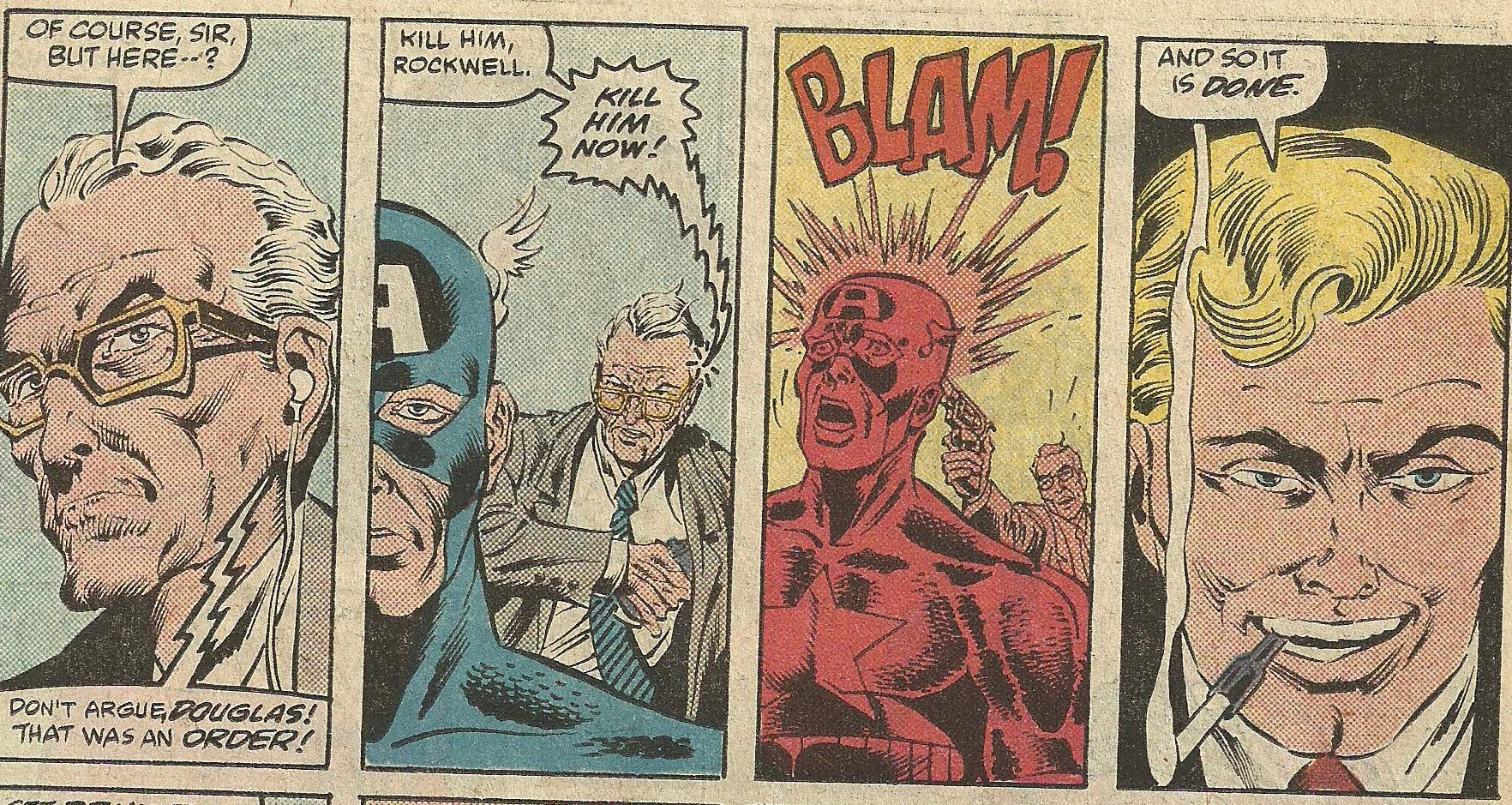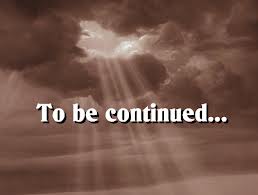Mainstream Comics, Ellen Burstyn & Jim Broadbent star in “The Momentum of Things”
/That's 30 issues, fella. That's over $120 of cascading plot. That's probably over 70,000 words of dialogue. (Eyes boggle)
To be, or not to be, that is the question:
Shakespeare – Hamlet 1:1
According to the work in the public domain there are about 32,000 words in Hamlet, FFS.
Given my druthers, I'd rather have a blast of something like this:
Follow me! Into the maw of insanity!
So, gang, here's your problem.
- Tragedy at the Walgreen's "Out of eye shadow?!?!"
Of course, not JEM specifically but rather this meandering blech that is now mainstream comics. Don't believe me? Listen to Vince Gilligan!
It’s helpful to have an end date. Most shows are designed to go on into perpetuity – to go on indefinitely. You don’t want it to end, but, actually, desiring an end date from early on held us in good stead.
Vince Gilligan – Creator – Breaking Bad
Our desire to apparently complicate the uncomplicated is a real thing. A real big problem. It's strangling something we love. To be honest, it's ripping it to pieces. You pick up something in the middle of that 30 issue diagram and your brain is going to turn into oatmeal. PORRIDGE, I SAY!
What is needed, for both thee, me, and the royal WE is a little bit of a format redefinition.
And that realization left me gasping. How, where, to what degree? And then, a bolt from the blue. Combing my rapidly dwindling longboxes this week I came across a massive stack of What If… from the volume II era (late 80’s).
WHAT IF… The Avengers Lost the Evolutionary War? WHAT IF… Steve Rogers had Refused to Give Up Being Captain America? WHAT IF… Iron Man Lost the Armor Wars? WHAT IF… The Fantastic Four all had the Same Power? WHAT IF… The Vision had Conquered the World? WHAT IF… Phoenix Rose Again? WHAT IF… The X-Men had Stayed in Asgard? WHAT IF… The Avengers Lost Operation Galactic Storm?
In the strictest sense, a lot of this was CRAP comics. Tryout art. HACKneyed dialogue.
Uuuuuuurgh
But on further inspection, and I say this with some level of seriousness, this is (or, rather, was) the last vestige of verve and piss in mainstream comics.
I challenge any individual to the patented“What if…” F You set-up. Can anyone find a comic that goes from the equivalent of the panel above to the panels below in less than two pages?
What you can’t really debate or put down about it was the amount of single issue ambition here. Sure, they’re imaginary stories. But as we famously know, “Aren’t they all?” What I was absorbed by in these stories was the sheer amount of FINISH on display. Things get done here. Wrapped up and put down all the way through. Whether that be Cannonball marrying a dwarf princess or the Fantastic Four all getting Human Torch powers – burning down a slum irresponsibly – and killing an adorable street urchin through their reckless hubris.
Things get done.
What I really found myself asking – as retailers and publishers struggle to identify the best delivery method for comics - Is whether or not long form serialized storytelling is rewarding or merely masturbatory? When something so deliriously underproduced, rushed, and throwaway could give me such a jolt I was left wondering why the "brightest minds" in the comics biz spend years telling stories that go nowhere and do - largely - nothing of lasting consequence.
Many (in internet terms) weeks ago I stumbled into a volley of barbs between the unanimously loved DEAR LEADER Brian "SAVAGE" Hibbs and one Jennifer de Guzman. Jennifer is, according to twitter bio and I have no reason to doubt it, PR and Marketing Director at Image comics.
This person, dear reader, is the tip of the spear when it comes to how the most bleeding edge – for all intents and purposes mainstream – comics company chooses to represent itself to the world. She must be very good indeed. So, in one corner the world-weary retail mastermind. In the other, the probing, challenging new method seeking distribution executive. Should be smooth sailing, yeah?
Well…
The crux of the “AHEM” discussion seemed to be the legitimate viability of short term “mini-series” versus ongoing titles in the current marketplace.
Now, fair being fair, these two fine folks must work together to simultaneously sustain and reinvigorate comics. This was all one night’s worth of twitter spit balling. I was a few cups in reading it so I can only assume they were a few cups in writing it. Logical, right? So, anywho, get these two together in a room and legitimately good ideas will come of it because they are both dedicated and passionate individuals who believe comics are worth a great deal of their waking hours and unlike us have committed their professional lives to that (slightly more than) 4 color gambit.
The problem is – neither of them can wave a magic wand to get the books selling like early 90’s Aunt May wheat cakes again. The question that arises from that problem is – where do they BEGIN to get books selling like the aforementioned wheat cakes?
Side Note - Yes, that is Uncle Ben as Silver Surfer.
I think it’s fair to say that at this point anything is worth a shot. I don't want to speak for Brian. He knows via hard earned experience what sells in his location. As a fellow small business owner I can say for myself that I tend to look at “tried and true” methods. Publishing companies seem to feel a bit more comfortable working on different delivery vehicles. It’s the thing they can control – format of content – via their solicitation or publishing choices. Whether it’s a mini, maxi, annual, prestige, jumbo, or even the most elusive prey of all – THE DOUBLE SIZED ISSUE – publishers have long been tweaking the delivery system.
How – How – HOW?!?! How to get the people back?
Is it like this?
Look on my DIAGRAMS ye mighty and despair! - Jonathan Hickman (Allegedly)
A Traumatizing Apologia for New Avengers
Nuanced. Oo, yes. Swaive and De-Boner as the old man used to put it. But lemme ask you this:
Does it put butts in seats?
The simple answer is no. Now, this kind of thing does bring some proverbial milkshake to the yard. Established readers, with a deep investment, a subtle appreciation of nuanced characterization, a willingness to follow the Byzantine pathways of a critical and calculating mind dedicated to telling what is - for all intents and purposes – a multi-year story….Ah, ah, ah. Navel Gazing. YOU ARE NAVEL GAZING.
Now, listen, until Watchmen and its 80’s brethren made it passé to have clunky in-issue recaps of what had immediately come before (try reading a couple hundred issues of Amazing Spider-Man digitally and tell me it’s a seamless story) we had what were largely anthology comics.
In an anthology any comic basically makes use of the archetypal nature of the protagonist and tells a story that can fit with what any schmoe can understand from that single issue. It can be picked up by anybody and they can be sucked in by art, wit, word play and technical skill. “Hero, got it.” “Villain, check.” “Cool fight scene at Rockefeller ice rink.” “Oh, he called him a canucklehead!” "What a neat twist - his glasses broke on the steps of the library!"
Somewhere along the line - and wiser comic heads than me will know the date - some bright bulb figured out if you made an issue only PART of the overall story then the hapless chump buying the thing (That's US, by the way) would need to buy the next one to get the story. But then, why bother with two parts when you can have three? Or Twelve? Or THIRTY?
The problem is, Writers can totally play it safe with a meandering 12 issue story. You can break it into two six issue chunks, plod around for the first four issues of both chunks, deliver a lightweight resolution or, GASP, CONTINUATION
…and then hurry home in the last two issues to the status quo. “Look, everybody, they didn’t kill the Human Torch after all!”
That’s what diagrams get you. That’s what laziness and a navel gazing market conspire to get you. That’s what serialized fiction in comics has mutated into.
Marc Maron recently sat down with Sam Simon, (He of Simpsons greatness and glory) talked about his terminal cancer, and the shitness of serialized fiction vis a vis the new Charlie Sheen piece of garbage he’s working on half a day a week as a favor to a friend.
“It’s called a 10 / 90 show…ugh, it’s death. It’s just the end of anything being good. You do 10 and then they pick up 90. What? Like if it’s no good after 40 episodes what do they do with it?”
He burns people in this thing – why not, right? And it’s breathtaking.
The takeaway for comics and writers - REGARDLESS of delivery method – is that there is a real need to break out of the cycle wherein they commit to these long form pointless wank explorations of nothing that ouroboros-like wind up back at the start and return to the status quo. That's why readers bleed from titles if you ask me. If you're telling me facets of the same story for 30 friggin issues with a whole lot of...
...then no wonder people are falling off left and right? Who has the freaking endurance? Not everybody was put on Earth to run marathons, comics! Some of us just don't have the wind!
Look, it's simple. If you want status quo then develop characters and story arcs that fit into anthology style universes. Bart Simpson is 10 years old forever for a freaking reason and it's a GOOD ONE. Interesting, funny, weird shit happens to 10 year olds. If you want serial fiction then you must NOT spend years of issues going nowhere! It’s fundamental! It’s elemental! Sliding timeline be DAMNED!
I'm going to leave you with a big, important quote. This quote explains why it's awesome when Cap gets shot in the head and the book ends. Why it's great when The Vision conquers and becomes benign dictator of Earth. Why it's possibly the greatest comic thing ever when Superman flies into the Sun to save us all.
Dread is an underutilized emotion on TV. This is most likely due to the shackles of serialized storytelling that, impossibly, demand both constant forward momentum and deeply settled consistency. Most shows, even the very best of them, traffic in the illusion of change, not the thing itself: The Sopranos was never really going to whack Tony, and Nicholas Brody isn't going to be martyring himself on Homeland as long as Damian Lewis is winning Emmys. It's hard to feel like something terrible is going to happen when the multiseason model of television remains too invested in nothing happening at all. Because Game of Thrones began its life, like Samwell Tarly's insider knowledge of castles, as a series of marks on paper, it's not bound to this risk-averse small-mindedness. I give the show a lot of grief for all the ways its fealty to pre-existing source material hampers the dramatic burst and bloom of a typical television season, but it's in episodes like last night's that the advantages are made abundantly clear. Only Game of Thrones can blow up the present like this, because only Game of Thrones already knows its future.
-Andy Greenwald Game of Thrones, Season 3, Episode 9: It's Like 'Rains' on Your Red Wedding Day
Over 5 million people watch this show. And it's growing.
No more TO BE CONTINUED. COMICS. I BEG YOU.





















